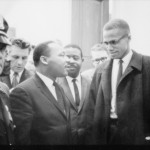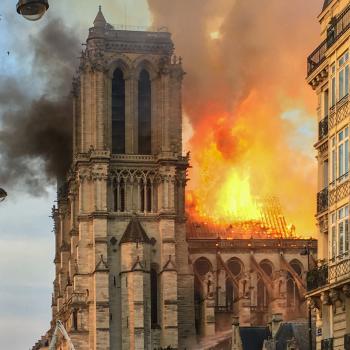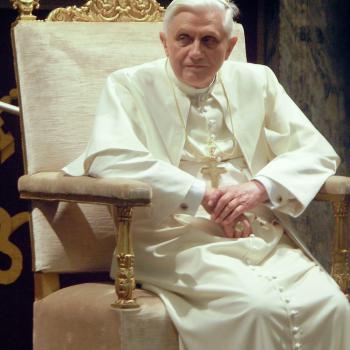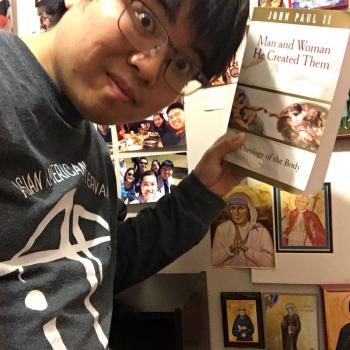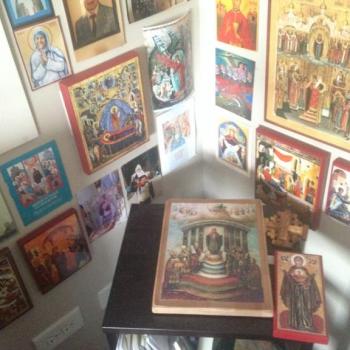I will eventually write part 4 of the ‘What’s So Good About Being Anglican?’ series, but as Churl might need something more immediate, I wanted to say a few quick words about the Anglican charism before giving it a fuller treatment in Part 4. Consider this a trailer of sorts.
Churl has been responding to questions about why he cannot stay Anglican with a characteristically robust account of why he needs the Roman Catholic Church as a body in order to sustain his faith. His previous two posts on Anglicanism–the one about Anglicans seeing Catholicism as the ‘Orient’ and the one in which he laments that Anglicans do not have a robust enough account of ‘obedience and catholicity’–should be taken seriously as structural problems within the Anglican Communion that must be tackled not only for internal housecleaning, but for the sake of ecumenical dialogue for full, visible unity in the church catholic.
Yet in the midst of this theoretical talk about the problems of structure in the Anglican Communion, I wonder whether a better approach is to drive this conversation down to what’s actually happening on the ground as the Spirit is blowing the Anglican Communion and the Roman Catholic Church together. This can be seen in the recent elections of Jorge Mario Cardinal Bergoglio to serve as Pope Francis and Justin Welby to serve as Archbishop of Canterbury. I have written earlier on both, but I have concentrated on Pope Francis. Today, I want to say a few words about Justin Cantuar in what can be arguably called a ‘new Pentecost’ for ecumenical relations.
Opening his first press conference on being elected Archbishop of Canterbury, then-Archbishop-Elect Justin Portal Welby invoked the Cursillo prayer of the Holy Spirit over his episcopate: ‘Come, Holy Spirit, fill the hearts of your people and kindle in them the fire of your love.’ This prayer pops up everywhere in the Archbishop’s work. It most recently appeared as Archbishop Welby concluded his incredibly thoughtful speech on ‘revolutions’ at the Church of England’s synod. Variations of it pepper his speeches, particularly as they touch on the Anglican charism of reconciliation.
There has been a great deal of focus on Justin Welby as having first learned pastoral work from the Alpha Course at Holy Trinity Brompton. Called an ‘Alpha evangelical,’ Welby has recently been back for an interview with HTB’s vicar, the Rev. Nicky Gumbel, himself the poster boy for the Alpha Course for having developed it to international success after it was launched by his predecessor, the Rt. Rev. Sandy Millar.
To reduce Welby to Alpha, however, would miss the breadth of his life in the Spirit. Of course, he is an Alpha evangelical, and thank God he is, for the Alpha Course is indeed a key contribution to parish evangelism even beyond Anglican circles, as is HTB’s music in the work of Andy Piercy in the past and Tim Hughes in the present. Yet HTB is not all there is to Welby. He recounts in the interview with Nicky Gumbel that shortly after the death of one of his children, Johanna, in a car accident, he and the HTB staff visited the Vineyard Movement’s John Wimber in Anaheim and received a very compassionate prayer despite the movement’s emphasis on healing, which did not happen in Johanna’s case. Moving into seminary, then ordination, and then his first curacy, Welby became drawn to Catholic social teaching and to monastic communities, reading Rerum novarum and discovering many modes of prayer, all of which came to the fore in his Journey in Prayer as he walked through five dioceses en route to Canterbury Cathedral. He talks about his own eucharistic adoration, praying through the liturgy and also carrying a communion set with him when he was a reconciler from Coventry Cathedral in Africa so that when it became apparent that his life was on the line, he celebrated the Eucharist to, as he puts it, ‘clear the accounts.’ He speaks of ‘revolutions,’ of how the Spirit leads us to ‘fresh expressions,’ embracing even modernist movements in Anglicanism as he brings the church into incarnational encounter with the modern world, especially in his policy work responding to government austerity.
Justin Welby is no mere Anglican evangelical. He is also catholic. He is also charismatic. He is also latitudinarian. He is an ecumenist. He is, in a word, all of Anglicanism in one person.
What Churl wants to know is: what is that Anglicanism, though? If there is no way to speak of true ‘Anglicanism,’ then how can we even talk about Anglicanism? What if there is no there there?
This is where the figure of Justin Cantuar steps in, calling the Anglican charism one of ‘reconciliation in the world’ and deriving it from the ‘renewal of prayer and praying communities.’ From where does he derive this account, though?
The answer is one that I have yet to see discussed: the Anglican Cursillo Movement.
The Cursillo Movement is arguably the fullest expression of Catholic-Anglican relations I have ever seen. Cursillo was first born in the Roman Catholic Church in the aftermath of the Spanish Civil War at St. James of Compostela. It is a retreat of sorts that brings parish members in for a weekend intensive set of workshops and prayer groups led by people in the parish who are only allowed to go by their first names, no titles. It is a time of intensive prayer for parish renewal in the face of political upheaval and a time of discovery for lay people in the parish as to what their charisms are. Originating in the Catholic Church, it was imported into Anglicanism in specific dioceses with the specific instruction that Cursillo is only allowed to happen if the bishop says that it can. In some dioceses, bishops themselves take off their mitres and join Cursillo groups as participants, often even surprising fellow participants when they learn that the bishop was sitting with them at dinner, and they did not even know it. If Anglicanism gave the world Alpha, the Catholic Church gave the Anglican Communion Cursillo, and we are extremely grateful for that gift of parish renewal.
I have written often of much of the pain that I experienced in my ministry internship and have not written of much of the good that I learned there. I must repent, for Cursillo was one of the good things. As it happens, my ministry mentor when I was an apprentice was one of the key figures in the Diocese of New Westminster’s Cursillo Movement in the 1980s and 1990s. Because he is Irish and stood godfather to me at my confirmation into the Anglican Communion (a moment in which I really believe that I received an Anglican charism), I often feel like there are two untold secrets about my attachment to Anglicanism, the first of which was that I was received into the Communion through the graces of an Irishman who felt the full brunt of the Protestant-Catholic skirmishes in Belfast and whose voice in my head daily goads me to reconciliation, and the second of which is that I understand Anglicanism almost completely through Cursillo lenses because that’s simply what I was taught.
I never attended a Cursillo weekend, as it had been canceled by the bishop in the 1990s. I just happened to be trained in ministry for two years by a Cursillo figure who made me feel like every moment, even the most awful ones when I felt my whole ministry disintegrate, was part of a long Cursillo parish residential discovery. I went often to his office, distracting him from his own preparation work for children’s ministry (sometimes I helped, but I was often bad at the crafts). We ate so much together that I could memorize his various menu favourites at the country food place that we frequented and the Chinese tea cafe at which we ate when he didn’t want country food; I was also in possession of his TimCard for Tim Horton’s for several months. He often made it feel like leading the youth group and the second-generation English service was like a residency (which is what made parts of it devastating when my plans fell apart). On Good Fridays, the two of us would stay up through the night at the parish, praying for the church and telling Irish jokes. He even trained me to brew coffee after I made several cups that tasted more like syrup than the liquid elixir of life.
It was in this context of living life deeply in a parish and learning to be prayerfully open to the Spirit that I learned about my gifts as an ordinary Christian. I learned that whatever academic work I was doing had to be at the service of the parish–not governed by it, but brought into conversation with other people who were working in different parts of the Father’s world. As in a Cursillo weekend, I was not special; I was ordinary, simply contributing my small gifts to a larger project of healing and reconciliation in the world. To do that, I had to be open to conversation, both with people in the parish and with the living God in prayer, and I had to learn that prayer was simply doing life with God. It was very ordinary stuff. It was an accidental Cursillo experience in a diocese where Cursillo had been canceled more than a decade before I began my internship.
In short, my mentor impressed on me that we live in a parish, exercising our charisms as part of the local church for the life of the world around us. Those charisms, in turn, are discovered in prayer through the Holy Spirit and grounded in the parish work of living life together as the church in the midst of the world.
That is Anglicanism, plain and simple: the parish charism of prayerful openness to the Spirit. And thus as I heard the Archbishop of Canterbury open his episcopate with the Cursillo prayer, my jaw hit the floor. This was the Anglicanism in which I had been trained. This was the Anglican charism that I knew that I still exercised. This was the emphasis on lay parish ministry that I still treasured.
And so it is that I’m not worried if someone like Churl needs to head over to Roman Catholic waters to find sustenance for his faith. I’m not anxious at all, because if this is the Anglican charism, any schism that we have with the Catholic Church is illegitimate anyway. After all, this particular Anglican openness to the Spirit–which is what i will discuss in part 4, so I won’t get ahead of myself by giving away what’s so uniquely ‘Anglican’ about it–is shared by Catholic parishes and Orthodox congregations, by free church polities and mainline gatherings. This parish charism makes us ecumenical, so if Churl feels that he is better suited to engage this ecumenical conversation from the Catholic side of things, yes, of course, he should go there.
But meanwhile, we who have been confirmed into the Anglican Communion will exercise our charisms as we stand open to the Spirit, and we pray the Cursillo prayer with Justin Cantuar as we live in our parishes and seek to contribute the fullest expression of the gifts of the Spirit to renew the face of the earth: Come, Holy Spirit, fill the hearts of your people and kindle in them the fire of your love.
Amen.


